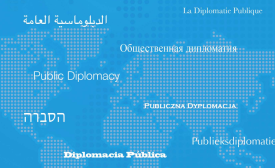culture

As all eyes turn to London in the coming weeks for the Olympics, a pageantry of cultural symbolism will be on display. Sometimes the most important messages in public diplomacy are the unspoken, symbolic ones. Anthropologist Edward T. Hall called it looking for the “eloquent cues.”
London may be the focus of public diplomacy attention and reap the greatest benefit; however, all countries are likely to seize and squeeze what public diplomacy mileage they can when the international spotlight shines in their direction. When you watch, watch for the cultural cues.
Residents of Mauritius, Benin, Cairo, Paris, Malta, Seoul, Berlin, Tokyo and Ulaanbaatar can engage Chinese culture and meet Chinese people in their homelands at these Chinese culture clubs. This impact could be seen at a recent demonstration by more than 100 tai chi students from the Mauritius Chinese Culture Center at Lady S. Ramgoolam State Secondary School in Mauritius' Port Louis.
“Today, we have uploaded a collection of UAE nation brand logos, which were proposed during the last Cabinet session. The UAE nation brand logo will promote the UAE & tell its story to the world. I want all of you to choose the design you think is best. All the relevant entities shall coordinate to use the logo to communicate the qualities of the UAE in areas like economy, culture & tourism.”
The Chinese government has set up more than three hundred Confucius Institutes in 100 countries as part of a new push to boost its soft power. The centres are usually set up as a joint initiative among a host foreign university, a Chinese partner university and the Hanban, which runs the programme.
SHANGHAI --- Zhao Qizeng, China’s leading proponent of public diplomacy, wrote, “Culture is the soul and life of a nation.” That concept is the driving force behind much of China’s exercise of soft power, and other countries that deal with this superpower need to understand the value the Chinese place on their language, traditions, and other cultural elements of their national life.
India has reached out to Africa with an initiative to foster a People-to-People (P2P) understanding with Africa. “With 70 per cent of the population in Africa and India below the age of 25, promoting engagement between youth in Africa and India is imperative to pave the way for a shared future," said Navdeep Suri, the Joint Secretary, Public Diplomacy Division, Ministry of External Affairs, India.

The Cultural Awakening in Public Diplomacy is the fourth and latest issue of CPD Perspectives on Public Diplomacy for 2012. Written by R.S. Zaharna, a CPD Research Fellow 2011-2013, the paper addresses the oversight of culture in public diplomacy and makes a case for its growing influence.
Building China into a socialist country with strong cultural influences is a core principle... In order to achieve this goal, we must understand how best to enhance China's soft power and introduce the Chinese culture to the rest of the world. Take the book publishing industry as an example.







